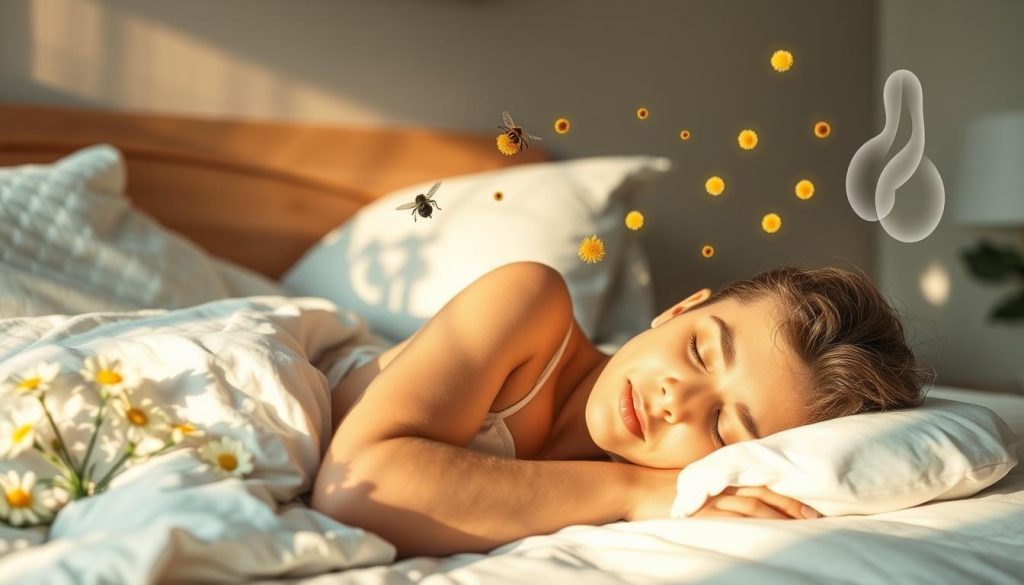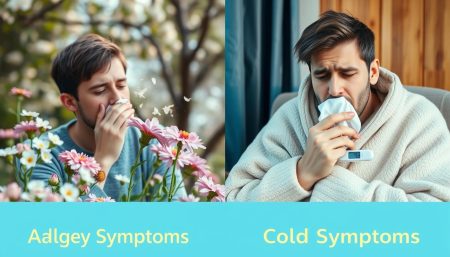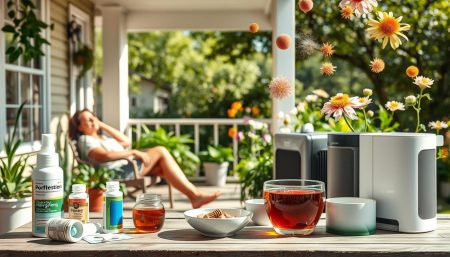Millions struggle with allergic rhinitis, a common problem that causes inflammation and congestion. This issue often makes people wonder if it can lead to sleep apnea. Understanding how these two health problems might be connected is key.
Both can greatly affect our quality of life. Knowing how one might make the other worse is important. It helps us find better ways to sleep well and stay healthy.
Key Takeaways
- Allergic rhinitis and sleep apnea are significant health concerns potentially affecting respiratory function and sleep quality.
- While allergic rhinitis does not directly cause sleep apnea, it can aggravate its symptoms through nasal congestion and airway inflammation.
- Understanding the complex relationship between these conditions is crucial for effective management and treatment.
- Seeking a medical evaluation, such as a sleep study, can offer insights into the presence and severity of a sleep disorder.
- Management strategies for allergic rhinitis may lead to an improvement in sleep apnea symptoms.
Understanding Allergic Rhinitis and Its Symptoms
Allergic rhinitis, also known as hay fever, affects many people. It can cause more than just discomfort. It can lead to serious health issues. Knowing about allergic rhinitis and its symptoms helps manage it better.
Defining Allergic Rhinitis
Allergic rhinitis is an inflammation in the nasal passages. It happens when the immune system reacts too strongly to allergens. Symptoms include sneezing, congestion, runny nose, and itchy eyes.
Common Allergy Symptoms Linked to Rhinitis
Allergic rhinitis can make daily life hard. Symptoms include:
- Nasal congestion and runny nose
- Frequent sneezing
- Itchy nose, eyes, ears, and throat
- Watering eyes
- Postnasal drip
Recognizing Seasonal vs. Perennial Allergic Triggers
Allergic rhinitis can be caused by different allergens. These can be seasonal or perennial. Knowing the triggers is key to managing the condition.
| Allergen Type | Examples | Seasonal or Perennial |
|---|---|---|
| Pollen | Trees, grasses, weeds | Seasonal |
| Dust Mites | Household dust particles | Perennial |
| Pet Dander | Cats, dogs | Perennial |
| Molds | Spores from damp areas | Seasonal and Perennial |
Each allergen affects people differently. Knowing if your rhinitis is seasonal or perennial helps tailor your treatment. This way, you can better manage your symptoms.
The Link Between Allergic Rhinitis and Sleep Apnea
Looking into the connection between allergic rhinitis and sleep apnea shows a complex relationship. Allergy symptoms can greatly affect sleep disorders. When someone has allergic rhinitis, their nasal passages get inflamed and blocked by allergens. This can make it hard to breathe normally while sleeping.
This situation often leads to obstructive sleep apnea. This is a serious sleep disorder where breathing stops and starts many times.
Nasal congestion, a key symptom of allergic rhinitis, is crucial in obstructive sleep apnea. Swelling in the nasal tissues makes people breathe through their mouths. This can lower sleep quality and cause more awakenings at night. Also, having allergy symptoms at night can make sleep apnea worse, increasing health risks and sleep problems.
- Allergic rhinitis leading to chronic nasal congestion and airflow obstruction.
- Mouth breathing during sleep due to nasal blockages.
- Increased frequency of sleep disturbances and nighttime awakenings.
Studies have found a clear link between how bad allergic rhinitis is and the chance of getting sleep apnea. The main issue is airway blockage during sleep. More severe nasal congestion from allergies raises the risk of obstructive sleep apnea.
Healthcare experts often suggest a multi-faceted approach to manage these risks. This includes regular allergy treatment to reduce inflammation and congestion. Treating allergic rhinitis not only relieves symptoms but also helps prevent sleep apnea.
It’s important to tackle allergic rhinitis and its effects on sleep disorders like sleep apnea. This is key to better sleep health and quality of life. More research and education on how these conditions interact are needed to develop effective treatments.
How Nasal Congestion Affects Sleep Patterns
Nasal congestion does more than just cause discomfort. It disrupts sleep patterns significantly. Swollen nasal passages make breathing through the nose hard or even impossible during sleep. This leads to poor sleep quality and more sleep disturbances.
The Impact of Nasal Obstruction on Sleep Quality
Nasal congestion makes it hard to breathe through the nose, leading to mouth breathing. This is less natural and can cause dryness and irritation. It prevents deep, restorative sleep, leading to fatigue and decreased energy during the day.
Chronic Snoring and Its Connection to Nasal Congestion
Chronic snoring is often caused by nasal congestion. It’s not just annoying for partners but also a health risk for the snorer. Snoring can disrupt sleep, leading to sleep fragmentation and even more serious conditions like obstructive sleep apnea.
The link between nasal congestion, sleep quality, and snoring is a cycle. Managing nasal congestion is key to breaking this cycle and improving sleep.
| Condition | Impact on Sleep | Potential Long-term Effects |
|---|---|---|
| Nasal Congestion | Interrupts natural breathing pattern, decreases sleep quality | Heightened fatigue, mood disturbances |
| Chronic Snoring | Causes sleep fragmentation | Risk of cardiovascular issues, obstructive sleep apnea |
By tackling nasal congestion early, people can enhance their sleep and overall health. This reduces the chance of serious conditions related to snoring and sleep issues.
Obstructive Sleep Apnea: An Overview
Obstructive sleep apnea (OSA) is a serious health issue. It causes breathing to stop many times during sleep. These stops, called apneas, happen when the airway gets blocked by soft tissues in the throat.
This section dives into the details of OSA. It highlights why it’s key to spot and understand this condition early.
Understanding Obstructive Sleep Apnea
Obstructive sleep apnea is the most common sleep apnea type. It differs from central sleep apnea, which affects the nervous system. People with OSA have breathing pauses that can last from seconds to minutes.
These pauses can happen up to 30 times an hour. This disrupts sleep and can cause severe daytime tiredness and other health issues if not treated.
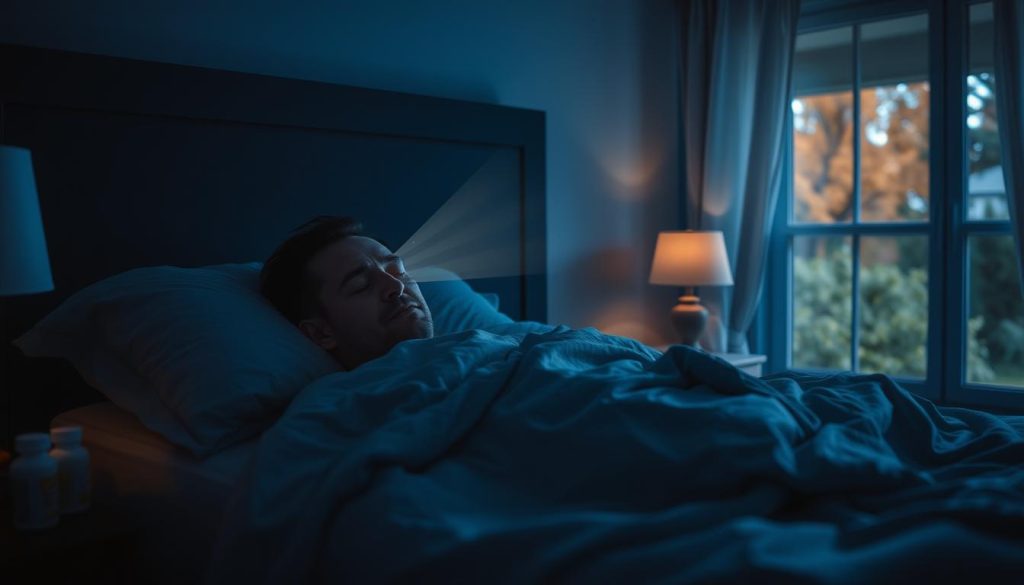
Risk Factors for Developing Sleep Apnea
Many factors can lead to obstructive sleep apnea. These include physical traits, lifestyle choices, and other health conditions. Knowing these risks helps in preventing and treating sleep apnea early.
| Risk Factor | Description | Impact Level |
|---|---|---|
| Excessive Weight | Being overweight greatly increases the risk of OSA. This is because fat around the upper airway blocks breathing. | High |
| Age | Sleep apnea is more common in older adults, especially those over 40. | Moderate |
| Nasal Obstruction | Issues like sinus problems or a deviated septum can raise the risk of OSA. | Moderate |
| Smoking and Alcohol | Smokers are three times more likely to have OSA. Alcohol relaxes the throat muscles, affecting breathing. | High |
| Family History | A family history of sleep apnea may increase one’s risk. This is due to inherited traits affecting the airway and facial bones. | Moderate |
Knowing these risk factors and acting early can greatly improve managing OSA. Learning about the condition and making lifestyle changes is key to better health outcomes.
Can Allergic Rhinitis Cause Sleep Apnea?
Looking into the link between allergic rhinitis and sleep apnea shows us how these conditions might be connected. People with allergic rhinitis often have a stuffy nose. This can lead to respiratory issues and might even cause sleep apnea.
Recent studies have tried to figure out if respiratory problems from allergic rhinitis can cause sleep apnea. The blockage of nasal passages in allergic rhinitis can make breathing hard during sleep. This raises the chance of getting sleep apnea.
| Allergic Rhinitis Impact | Resultant Sleep Condition |
|---|---|
| Nasal Congestion | Potential Development of Sleep Apnea |
| Interrupted Airflow | Lowered Sleep Quality and Apnea Episodes |
| Inflammatory Responses | Increase in Nighttime Respiratory Distress |
Dealing with allergic rhinitis well could help prevent sleep apnea. Doctors stress the need to manage allergic rhinitis symptoms to avoid more serious respiratory issues. This not only makes life better but also cuts down on health costs from untreated sleep problems.
Diagnosing Sleep Disorders Related to Allergic Rhinitis
Understanding sleep disorders linked to allergic rhinitis is complex. It begins with recognizing how allergies can block nasal passages and disrupt sleep. Healthcare providers use sleep studies and allergy tests to diagnose and treat these issues.
Methods for Diagnosing Sleep Apnea
Diagnosing sleep apnea involves polysomnography, a detailed sleep study. It records brain waves, blood oxygen levels, heart rate, and breathing. Home sleep apnea tests are also used, though they are less detailed.
These tests confirm sleep apnea and its severity. They show how allergic rhinitis might be linked to sleep problems.
The Role of Allergy Testing in Sleep Disorders
Allergy testing is key in linking allergic rhinitis to sleep issues. It helps doctors find out which allergens cause rhinitis. This knowledge helps them understand how allergies affect sleep.
Tests like skin prick tests and blood tests for IgE antibodies show allergic reactions. These reactions can worsen sleep conditions.

| Diagnostic Tool | Description | Relevance to Sleep Disorders |
|---|---|---|
| Polysomnography | Overnight sleep study monitoring multiple physiological parameters. | Essential for confirming the diagnosis of sleep apnea. |
| Home Sleep Apnea Test | Home-based, simplified monitoring of breathing and oxygen levels. | Useful for preliminary screening of sleep apnea. |
| Skin Prick Test | Test to determine immediate allergic reactions to multiple allergens. | Helps identify allergens that might contribute to nasal congestion and disturbed sleep. |
| Specific IgE Blood Test | Measures the level of IgE antibodies to specific allergens in the blood. | Provides a broader understanding of allergic sensitivities affecting sleep. |
Treating Allergic Rhinitis to Improve Sleep Apnea Symptoms
Fixing allergic rhinitis is crucial for better sleep apnea symptoms. A mix of medical treatments and lifestyle adjustments can really help. This combo can make sleep quality and health much better.
Medical Treatments for Allergic Rhinitis
Doctors mainly aim to stop inflammation and allergic reactions that cause nasal blockage. These steps can lessen sleep apnea’s impact. Here are some ways:
- Antihistamines to cut down sneezing, runny nose, and itchiness.
- Nasal corticosteroids to lessen inflammation in the nasal passages.
- Leukotriene receptor antagonists which target specific chemicals in the immune system.
Lifestyle Adjustments to Alleviate Sleep Apnea
Changing your lifestyle is key to managing sleep apnea. Here are some tips for those with allergic rhinitis:
- Keep a regular sleep schedule for better sleep.
- Use air purifiers in your bedroom to cut down on allergens.
- Try nasal irrigation with saline sprays or neti pots to clean your nose.
By using these medical treatments and lifestyle adjustments, you can feel better. You’ll see a big drop in sleep apnea symptoms and allergic rhinitis too.
| Treatment Type | Benefits |
|---|---|
| Antihistamines | Reduces sneezing and runny nose |
| Nasal corticosteroids | Decreases inflammation |
| Leukotriene Receptor Antagonists | Reduces allergic inflammatory response |
| Saline Sprays | Clears nasal passages |
| Air Purifiers | Less allergens in sleep environment |
Managing Allergic Triggers to Prevent Sleep Disturbances
Getting a good night’s sleep often means managing allergic triggers well. Allergies can really mess with your sleep, causing big problems. By knowing and avoiding allergens, you can sleep better.
Identifying and Avoiding Allergic Triggers
First, figure out what allergens bother you. Common ones inside are dust mites, pet dander, and mold. Outside, pollen from trees, grass, and weeds can be a problem. Knowing what makes you sick helps you take action.
- Use high-efficiency particulate air (HEPA) filters to capture allergens.
- Regularly wash bedding in hot water to kill dust mites.
- Keep windows closed during high pollen seasons.
- Maintain low humidity indoors to discourage mold growth.
Tips for Maintaining an Allergen-Free Sleeping Environment
Having a allergen-free sleep area is key for allergy sufferers. It helps manage allergens and ensures better sleep.
- Encase mattresses and pillows in allergen-proof covers to prevent dust mite exposure.
- Avoid carpeting, which can harbor allergens, opting instead for hardwood or laminated flooring.
- Regularly clean and vacuum using a HEPA filter-equipped vacuum cleaner.
- Consider replacing heavy drapes with easy-to-clean window treatments.
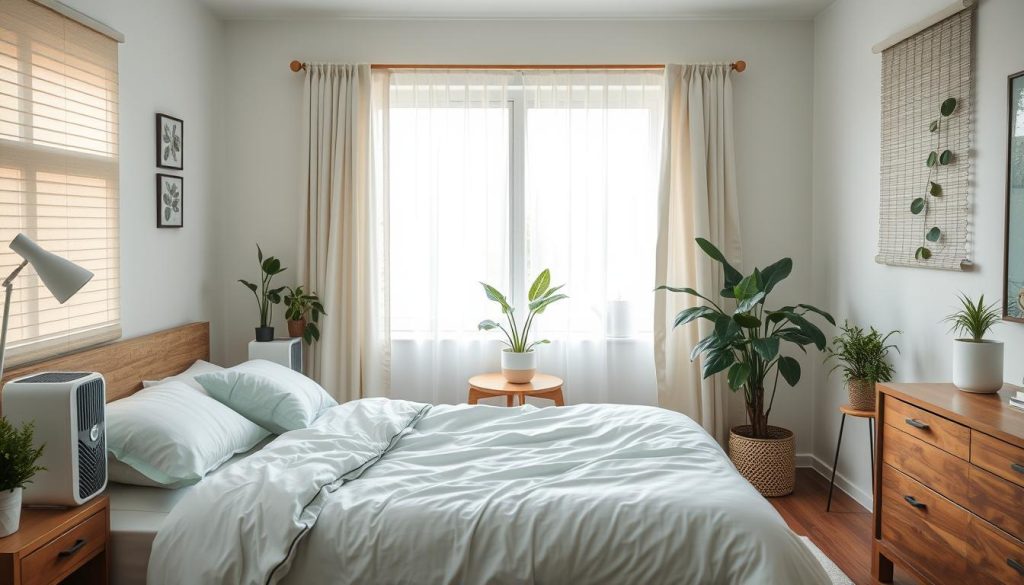
By managing allergic triggers and keeping your bedroom allergen-free, you can sleep better. These steps help not just those with allergies but everyone. They support better health by ensuring you get the sleep you need.
Exploring Surgical and Non-surgical Treatments for Sleep Apnea
There are many ways to manage obstructive sleep apnea, from surgery to non-surgical methods. Each option is suited for different needs and preferences. Knowing about these can help those with sleep apnea make better choices for their health and sleep.
Surgical Options for Obstructive Sleep Apnea
Surgical treatments aim to clear the airway by removing tissue. Uvulopalatopharyngoplasty (UPPP) removes throat tissue, while Maxillomandibular advancement moves the jaw to open the airway. These surgeries are for those with specific blockages in their airway.
CPAP Therapy and Other Non-invasive Treatments
CPAP therapy is a top choice for treating sleep apnea without surgery. It uses a mask to push air into the airways, keeping them open. Other non-surgical options include losing weight and sleeping on your side to avoid blockages.
- Advantages of CPAP: It stops airway collapse, reduces snoring, and improves sleep.
- Challenges: Some find the mask uncomfortable and may get dry mouth or nasal congestion.
| Treatment Type | Approach | Effectiveness |
|---|---|---|
| CPAP Therapy | Non-surgical | High |
| Surgical Procedures | Surgical | Varies by procedure |
Conclusion
This discussion has shown how allergic rhinitis and sleep apnea are connected. Nasal congestion and airway inflammation can hurt sleep quality. We’ve seen how these issues can affect sleep patterns and lead to a cycle of poor rest.
Learning how to treat one condition can help with the other. This offers hope for those dealing with these health problems. It shows that with the right care, sleep and life quality can improve.
There are many ways to treat these conditions, from medicine to changing your lifestyle. Getting advice from a doctor is crucial for a treatment plan that fits you. This approach can greatly improve your sleep and life.
We hope readers now understand the link between allergic rhinitis and sleep apnea. We encourage them to find the right treatment. Our goal is to help you get a good night’s sleep, free from discomfort and sleep problems.
FAQ
Q: What Is Allergic Rhinitis?
A: Allergic rhinitis is a condition where the nasal passages get inflamed. It happens when the body reacts too strongly to things in the air. Symptoms include sneezing, a stuffy nose, and a runny nose.
Q: Can Allergic Rhinitis Lead to Sleep Apnea?
A: Yes, it can. Allergic rhinitis can make breathing hard during sleep. This can lead to obstructive sleep apnea.
Q: What Are the Common Allergy Symptoms Linked to Rhinitis?
A: Symptoms include a stuffy nose, sneezing, and an itchy nose or throat. You might also have watery eyes, headaches, or sinus pressure.
Q: How Do Seasonal and Perennial Allergens Differ?
A: Seasonal allergens, like pollen, are only around at certain times. Perennial allergens, like dust mites and pet dander, are always present.
Q: What Impact Does Nasal Congestion Have on Sleep?
A: Nasal congestion can really mess with your sleep. It makes breathing hard, leading to poor sleep quality and interrupted sleep.
Q: Can Chronic Snoring Be a Sign of a More Serious Condition?
A: Yes, it can. Chronic snoring might mean you have obstructive sleep apnea. This is a serious condition that needs medical attention.
Q: What Are the Risk Factors for Developing Sleep Apnea?
A: Risk factors include being overweight, having a narrow airway, and a family history of sleep apnea. Smoking, alcohol use, and conditions like high blood pressure or diabetes also increase the risk.
Q: How Are Sleep Disorders Diagnosed in Relation to Allergic Rhinitis?
A: Doctors might use sleep studies to find sleep disorders. They also do allergy tests to see if allergies are making rhinitis worse and affecting sleep.
Q: What Treatments Are Available for Allergic Rhinitis?
A: Treatments include antihistamines, decongestants, and nasal corticosteroids. Immunotherapy and avoiding allergens are also options. Keeping the air clean at home helps too.
Q: How Might Treating Allergic Rhinitis Improve Sleep Apnea Symptoms?
A: Treating allergic rhinitis can help by reducing nasal congestion and inflammation. This can improve airflow during sleep and help with sleep apnea symptoms.
Q: What are Some Tips for Creating an Allergen-Free Sleeping Environment?
A: Use allergen-proof bedding covers and keep pets out of the bedroom. Air purifiers and regular cleaning can also help remove allergens.
Q: What Are the Surgical and Non-surgical Treatment Options for Sleep Apnea?
A: Options include lifestyle changes like losing weight and sleeping on your side. There’s also CPAP therapy. Surgical options like UPPP or maxillomandibular advancement are available too.












